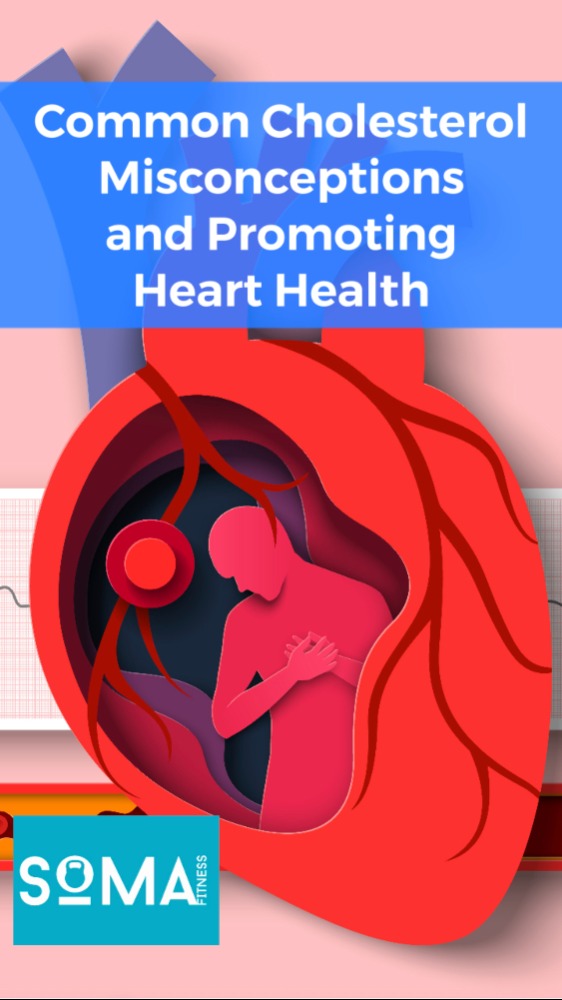Common Cholesterol Misconceptions and Promoting Heart Health
Within our personal training facility we often come across clients with high cholesterol and their main strategy commonly seems to be avoiding all foods with cholesterol and consuming more plant based foods, depending on the contents of these plant based foods it may not be the best strategy for overall health. As personal trainers we try our best to educate our clients and create healthy habits to ensure the long term health and well being of our clients what ever their aesthetic goals may be.
Cholesterol has long been associated with heart health, and the mainstream medical establishment has often perpetuated certain misconceptions surrounding this vital lipid. In this article, we aim to dispel some of these misconceptions, explain the differences between good and bad cholesterol, shed light on the importance of cholesterol in the body, discuss the damaging effects of vegetable oils on the cardiovascular system, suggest steps to take before considering statins for high cholesterol, and provide a list of natural nutrients, herbs, and supplements that can help manage healthy cholesterol levels.
Differentiating Good and Bad Cholesterol:
One of the most common misconceptions is that all cholesterol is harmful. However, it is important to understand that cholesterol itself is not inherently bad. High-density lipoprotein (HDL) cholesterol, often referred to as “good” cholesterol, plays a crucial role in transporting excess cholesterol from the arteries back to the liver for processing and removal. On the other hand, low-density lipoprotein (LDL) cholesterol, often labelled as “bad” cholesterol, can contribute to the formation of plaques in the arteries when present in excessive amounts.
The Importance of Cholesterol in the Body:
Cholesterol is an essential component of cell membranes, aiding in their stability and fluidity. It is also involved in the production of several vital substances, including hormones like estrogen and testosterone, vitamin D synthesis, and bile acid production. Without cholesterol, our bodies would struggle to function properly.
Vegetable Oils and Their Impact on Cardiovascular Health:
Contrary to popular belief, many vegetable oils marketed as “heart-healthy” may actually have detrimental effects on cardiovascular health. Certain vegetable oils, such as those rich in omega-6 fatty acids (e.g., soybean oil, corn oil), when consumed in excess, can cause inflammation in the body, potentially leading to an increased risk of heart disease. Instead, opting for healthier fats like extra virgin olive oil, avocado oil, or coconut oil can provide more favourable lipid profiles.
Steps to Take Before Considering Statins for High Cholesterol:
If you have been diagnosed with high cholesterol, it is crucial to explore non-pharmacological interventions before resorting to statins. Lifestyle modifications, such as adopting a heart-healthy diet, engaging in regular physical activity, managing stress levels, and quitting smoking, can significantly impact cholesterol levels and overall cardiovascular health. It is essential to consult with a healthcare professional to develop an individualized plan.
Natural Nutrients, Herbs, and Supplements for Managing Healthy Cholesterol Levels:
While dietary changes are fundamental, certain natural nutrients, herbs, and supplements may also support healthy cholesterol levels. Some examples include:
Nutrients and Supplements
- Omega-3 fatty acids: Found in fatty fish and grass fed meat (e.g., salmon, mackerel, grass fed beef), omega-3s can help reduce LDL cholesterol and triglyceride levels.
- Soluble fibre: Incorporating sources like oats, legumes, fruits (e.g., apples, berries), and vegetables (e.g., broccoli, carrots) can help lower LDL cholesterol.
- Plant sterols and stanols: These compounds, found naturally in nuts (e.g., almonds, walnuts), seeds (e.g., sunflower seeds, pumpkin seeds) can help reduce LDL cholesterol absorption.
- Garlic: Known for its potential to modestly decrease LDL cholesterol levels, garlic can be consumed fresh or as a supplement.
- Coenzyme Q10: Statin medications may deplete levels of CoQ10, so supplementation can help maintain proper levels and support heart health.
Herbs
Commonly known as burdock root, burdock root offers various potential health benefits that may indirectly contribute to cholesterol management.
Antioxidant properties: Burdock root contains antioxidants that help combat oxidative stress and reduce inflammation in the body. Chronic inflammation can contribute to the progression of heart disease, including high LDL cholesterol levels.
Fibre content: Burdock root is a good source of dietary fibre, which can aid in lowering LDL cholesterol levels by binding to cholesterol and promoting its excretion.
Liver support: Burdock root has traditionally been used to support liver health. A healthy liver plays a crucial role in cholesterol metabolism and production, and supporting liver function may indirectly contribute to healthy cholesterol levels.
Blood sugar regulation: Maintaining stable blood sugar levels is important for overall cardiovascular health. Burdock root has been studied for its potential to help regulate blood sugar levels, and better blood sugar control can positively impact cholesterol levels.
Anti-inflammatory effects: Chronic inflammation is linked to the development and progression of cardiovascular diseases. Burdock root contains compounds that exhibit anti-inflammatory properties, which may help protect against cardiovascular damage and promote heart health.
Improves cholesterol metabolism, Research suggests that curcumin may influence cholesterol metabolism by promoting the expression of genes involved in cholesterol homeostasis. It may enhance the production of high-density lipoprotein (HDL) cholesterol, often referred to as “good” cholesterol, which can help remove LDL cholesterol from the bloodstream.
By understanding the misconceptions surrounding cholesterol and implementing lifestyle changes, individuals can take action and charge of their cardiovascular health. Prioritising a heart-healthy diet, avoiding excessive intake of vegetable oils, and considering natural nutrients, herbs, and supplements can all contribute to managing healthy cholesterol levels. However without conscious action of your health and well-being then you will be stuck with taking medication for the rest of your life.
If you are interested in becoming strong, healthy and improving your fitness then contact us to find out how you can begin working with a personal trainer.


Leave a Comment
(0 Comments)